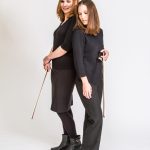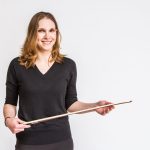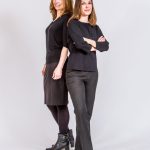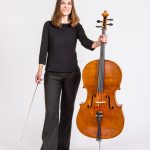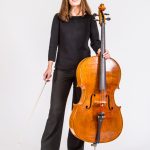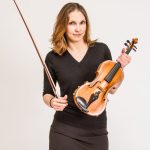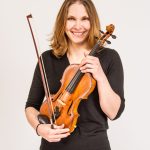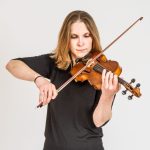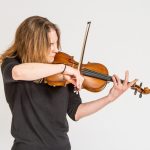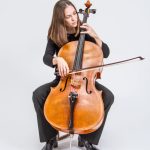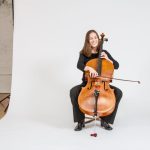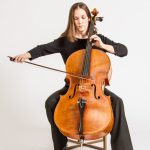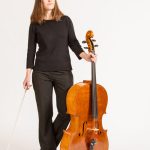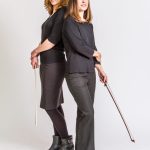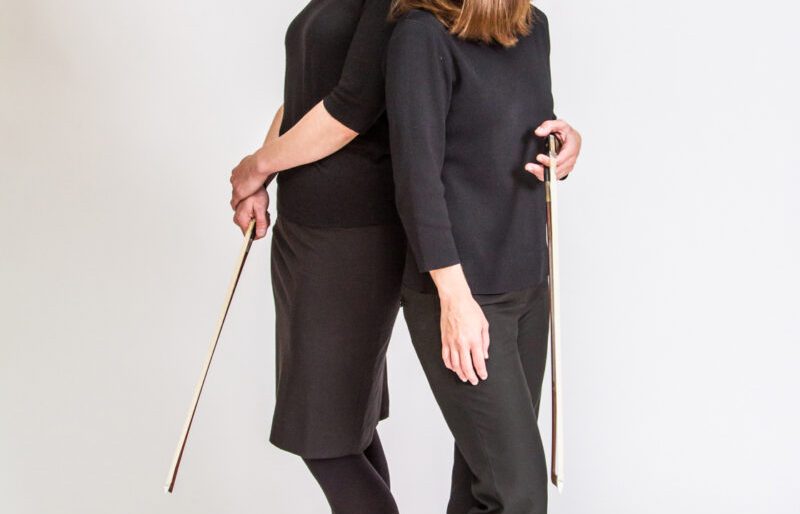
The Harvey Sisters | photo by Josh Pelta-Heller for WXPN
The High Key Portrait Series: The Harvey Sisters
“High Key” is a series of profiles conceived with the intent to tell the story of Philly’s diverse musical legacy by spotlighting individual artists in portrait photography, as well as with an interview focusing on the artist’s experience living, creating, and performing in this city. “High Key” will be featured in biweekly installments, as the series seeks to spotlight artists both individually and within the context of his or her respective group or artistic collective.
Cassia and Myanna Harvey have been quietly building a small empire of string music instruction. Music is a family affair for sisters raised in an Oak Lane home rich with the influences of art of all genres, and for the past twenty years Harvey String Teaching has been making proper players of hundreds of cello, violin and viola students of every level, from the prodigal four-year-old to septuagenarian novice.
Beyond local studio lessons, the Harvey sisters’ passion for music education has manifested as an extensive array of hundreds of lesson books for string musicians, each one a document of their unique and evolving approach to relating musical theory. Distributed internationally, the books are now purchased by musicians in over thirty countries, as C. Harvey Publications has begun to establish itself as a benchmark household name for string instrumentalists.
Of course they both play prolifically as well — everything from symphony solos to concert halls, chamber orchestras to lecture recitals. In recent years, they’ve reached beyond their classical roots too, collaborating with Philly Fringe Fest artist Abner Diaz for a multimedia installation, offering contemporary interpretations of ancient folk music from Asia, and at turns playing original Americana at popular local venues with folk band Acton Bell.
However, their published recordings have taken a backseat to their two decades of efforts in music education. More studio work may be on the way soon, but in the meantime you can hear some of Cassia’s and Myanna’s work with the Philmore Ensemble, a group founded twelve years ago at Temple University by flutist Amanda Heckman and heavy-metal-turned-classical guitarist Duane Large. And last month Cassia published her first record, The Russian Cello, now available on all the popular online music venues.
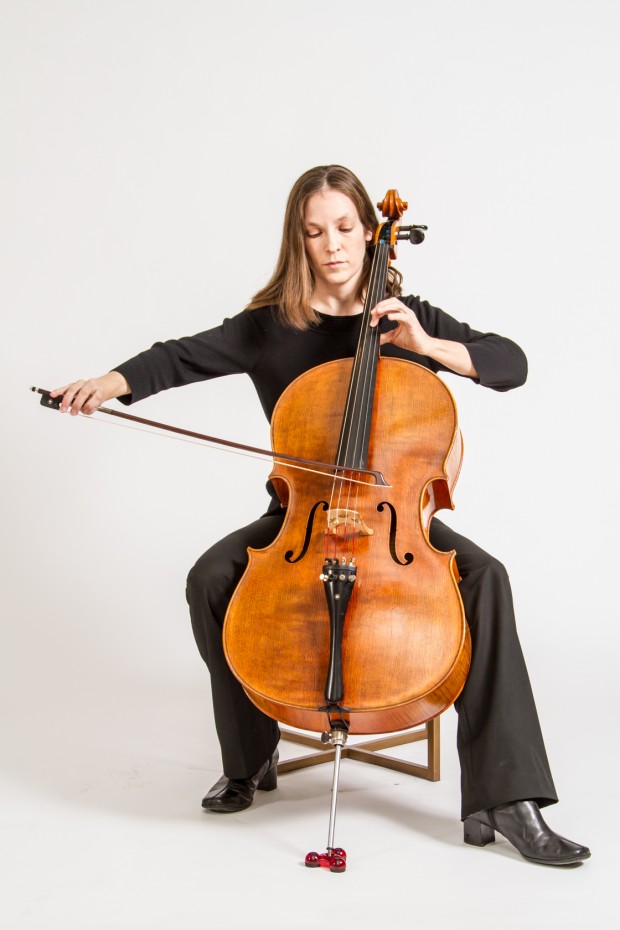
The Harvey Sisters | photo by Josh Pelta-Heller for WXPN
The Key: Tell me a little bit about Central High School, what do you remember most?
Cassia Harvey: I have always been on the outside of social situations, looking in occasionally or sometimes just lost in my own thoughts. I had a lot of social anxiety but I loved playing in the Central High School Orchestra and was actually able, through being in rehearsal every single day, to make friends with the members of the orchestra and even with a few people outside of it. High school became one of the most social times in my life and my memories are almost overwhelmingly positive. I remember the music we played more than the people I played with and even now, hearing Rimsky-Korsakov’s Capriccio Espagnol, Beethoven’s Pastoral Symphony, or a Rossini Overture takes me back to high school almost instantly.
Myanna Harvey: Music is definitely the thing I remember most about high school. Playing the violin was my identity, so I loved hunting down out of print recordings, standing in line for cheap student tickets at Philly concerts when my favorite performers came to town, and playing as much as possible. I absorbed a huge amount of classical and folk music, and started forming my own opinions about what it means to be a musician, and exactly what I wanted to play.
TK: How did you first get connected to the Philly music scene?
CH: I didn’t really know anything about how to make connections and get gigs when I started out. Fortunately, I started playing gigs with some teachers from high school and learned a tremendous amount; almost like an apprenticeship.
MH: I grew up in Philly, and my amazing parents are both in the arts — my dad is an artist and my mom is a violinist and violin teacher. We all played together growing up, and that was my first connection to the scene. After high school, our former teachers became our colleagues on the music scene, and we started getting gigs through them.
TK: Who’s your favorite Philadelphia artist, or which Philly artist influenced you most? This can be anyone, dead or alive, personal mentor or just an artist you love.
CH: It has to be my dad. He’s a fine artist; a painter who happens to have the most exacting ear for music that you can imagine. The tiniest bit off and he’ll know; he can sense the smallest weakness. He coached me growing up, he taught me vibrato, and he taught me to listen and critique my own playing; to teach myself when my teachers fell short. Philosophically, his complete disregard for any man-made system has been a huge influence. When I decided not to go to college, my mother was dismayed but my father wasn’t at all worried; he believed me when I said I was ready to think for myself and college would be unhelpful on the path I had chosen.
I knew I wanted to develop a new system for teaching strings and so I started writing cello books at age 19, writing through the night and playing and teaching during the day. But I was timid about entering the world of book publishing and it was my dad who pushed me to publish my first book. “Pushed” is an understatement; he quite annoyed me by mentioning it every single day until I found a printer and bought my first print run. But now I have written and published over 150 violin, viola, cello, and bass books and I know I would never have started publishing if it hadn’t been for him.
MH: The person who influenced me the most was my friend Duane Large, a guitarist/mandolin player who from passed away cancer almost two years ago. He played every genre of music imaginable, from classical to indie rock to heavy metal, and he dragged me along for a lot of it. We both wanted to play as much as possible, so I said yes to almost everything during the time that I knew him, and I met some amazing local musicians and composers who I’ve remained close to for many years. No matter how long of a day I’d had, he’d convince me to come and play violin and guitar duets late into the night, always accompanied by Haagen Dazs! We both had strong classical backgrounds, and we both branched out into other types of music while maintaining a strong connection to our roots. His energy and his passion for everything connected with music got me out of my comfort zone, and showed me how much fun making music can be, and I’ll always be grateful for that.
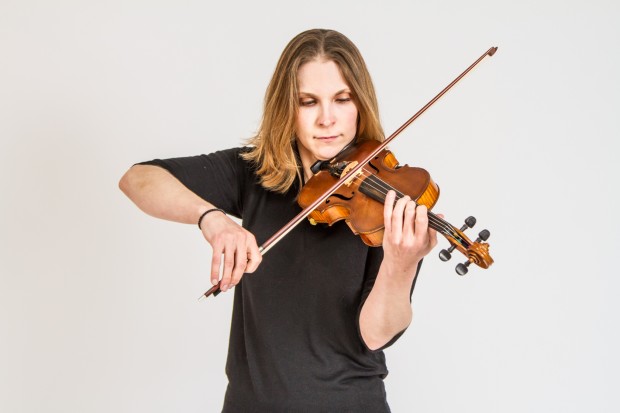
The Harvey Sisters | photo by Josh Pelta-Heller for WXPN
TK: Where did you play your first show in Philly? How did it feel to be on stage that night?
CH: I remember soloing in Drexel’s auditorium when I was in high school and it felt like I was flying. All of life was ahead of me and the atmosphere seemed electric. Years later, when I returned to the stage after some time away, I played at the Ethical Society and once again I was floating as I played. There’s just nothing like the headiness of performing; it’s a drug for sure.
MH: I remember the first concert my friends and I put on ourselves at the Ethical Society- we had no idea if anyone would even show up! I’m pretty sure we went into the red just to pay for the piano tuning. All of our parents and friends and neighbors and distant relatives came, brought food and drinks and more people, and somehow we had an audience. The atmosphere on stage that night was electric, partly from relief and partly from excitement. The momentum from that first concert propelled us forward, and got other musicians interested in playing with us for subsequent concerts. In some ways I think we’re still feeling that momentum almost 10 years later.
TK: Which Philly music venue is your favorite to play at, and why? This can be a venue that no longer exists.
CH: I liked playing on the street in Center City. I don’t know whether I have the courage to do that ever again; it takes tremendous artistic bravery. But we had some wonderful experiences playing as a duo; people cried, wrote us notes, told us stories of places the music reminded them of visiting. One woman wrote us a note that said “don’t ever stop playing”.
MH: I love playing in smaller, more intimate settings where things can be less formal and we’re free to communicate a little more with the audience. A performance at the Higher Grounds Coffee Shop last year was a great example of that — the audience had to crowd in a little because the space was tight, but it was great fun! Andrea Clearfield’s Salon is another venue I’ve enjoyed — the opportunity to play alongside such a wide range of performers is always a treat.
TK: What do you love most about the arts scene in Philly?
CH: I love that it has allowed me to play and teach and write, all on my own terms. It’s a free and open city in some ways and I am so very grateful that I could start performing at 9, start teaching at 16, start writing at 19, and start publishing at 24 without the credentials most classical musicians obtain and entirely on my own merit. That’s a great city.
MH: I love the fact that there are always other musicians and artists who are more than willing to play and collaborate and share ideas. We’ve worked with filmmakers like my friend Abner Diaz, photographers, visual artists, and musicians from every field.
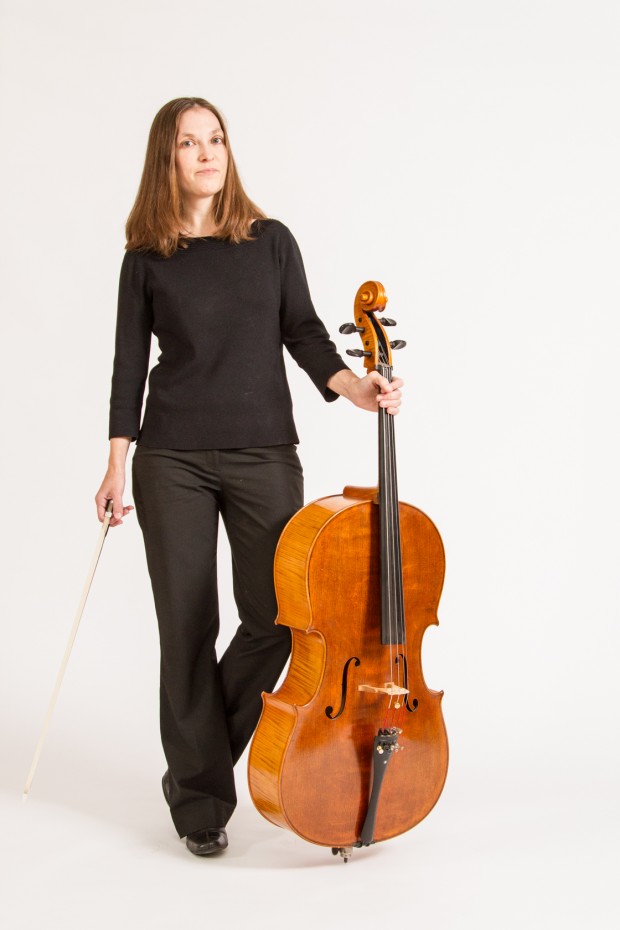
The Harvey Sisters | photo by Josh Pelta-Heller for WXPN
TK: What do you find most frustrating about trying to create, perform, or grow as an artist in Philadelphia?
CH: When you hear venerable orchestras in Philadelphia, they are wonderful. But it is very safe. You won’t see someone playing barefoot onstage. Unless, of course, it’s a deliberate marketing ploy approved by the board to bring in younger listeners. In my ideal world, music isn’t safe. It’s supposed to make us stop what we are doing, truly listen, then question, and maybe even make us go out and create something ourselves after we’ve heard it. It could be beautiful or beautifully ugly but it should be exhilarating, awakening us as humans from the death of constant commercial nothingness.
I just went to hear the New York Philharmonic and they played Stravinsky’s Rite of Spring. It was amazing; that music is so brutal. It sounded new, even today. Then they played a concerto that had been commissioned for the orchestra. It was very safe. Just modern enough to sound current, just pretty enough that the older donors wouldn’t complain. Just as predictable and acceptable as you can imagine. Where is the frenzied artistic energy and creative determination that groups of artists and musicians fomented in, say, Paris in the late 1800’s? Where is music that is so real you can’t stop listening? A performance so alive that you can’t look away?
Where does someone like my friend Tim Ribchester go? He’s the wonderful pianist on my new album, an orchestra conductor, and one of the most intense personalities I know. He just moved to Berlin from Philadelphia because he was willing to take the chance of failure to have the chance to make music that is truly real and great. Philadelphia is very closed in some ways, wedded to the idea of safe. Supposedly we need donors to start an orchestra, a board, and structure. I reject that entire approach. That structure is the way people who know a little about music or art control the people who are creating and make sure it’s all acceptable output. I think that we need musicians who are tired of being safe, tired of being asleep. Musicians who want to come together to create music they believe in.
And then we need some way for them to make a living apart from boards and big donors and organizations. Because in the end, that is my only real problem with the arts in Philadelphia: we are all desperate slaves to the need to make a living. And that makes us want to fit into genres, and be categorizable, and be accepted by the big organizations in our genre. It is the need for money that can destroy our chance at true creativity, if we let it, and that makes us all chase after safety.
MH: Sometimes I feel like I already know everyone! Of course that’s not the case, but I definitely enjoy it when I get the chance to expand my circle a little.
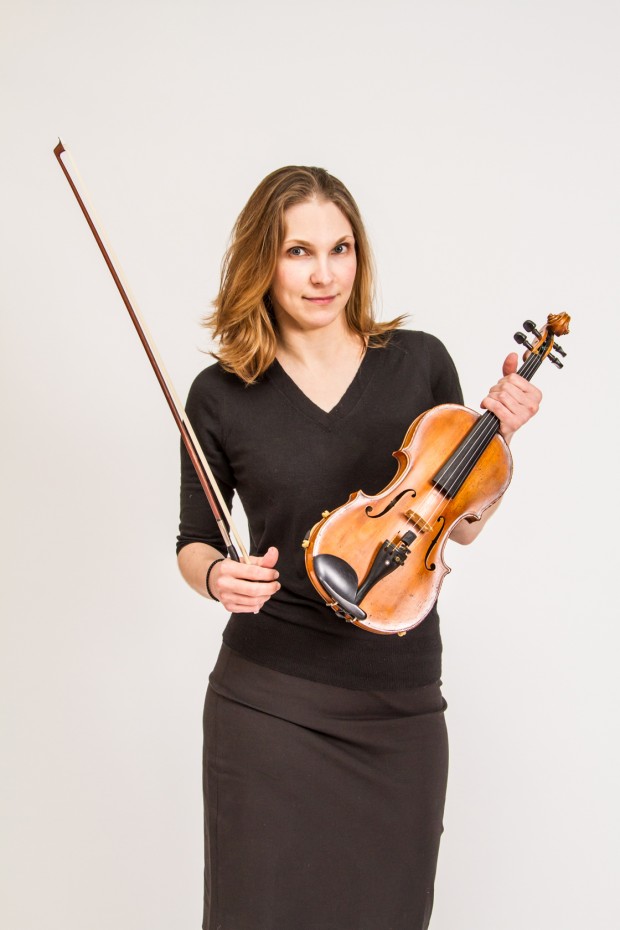
The Harvey Sisters | photo by Josh Pelta-Heller for WXPN
TK: Which neighborhoods have you lived in? Which made you want to live there forever? Which couldn’t you wait to leave?
CH: Olney, East Oak Lane, and I’ve spent some time in West Philly. I like how unpretentious some parts of Philadelphia can be; pretentious neighborhoods are intolerable. Olney was a great place to grow up in this sense, but even East Oak Lane is pretty laid back.
MH: I love the neighborhoods that show their history — some of the beautiful old houses in Mount Airy and East Oak Lane, parts of West Philly, and many other places around the city retain their old-world quality. I find the beauty and stately quality of the architecture so inspiring!
TK: How have you seen the city change in your time living here? Has it been for the better?
CH: The city mainly seems the same. More hipsters, but I think that the only change I really lament is the commercialization of La Colombe coffee off of Rittenhouse. Those beautiful tile tables are gone; I wrote so many cello books there! I sound like a grump. On with progress. And beautification and gentrification and all of it, I guess; I’ll find somewhere to write and play.
MH: I miss Tower Records, where all the music nerds could congregate without having to interact too much! But I think the music scene has become a little more open to new faces than it used to be, which is a good thing.
TK: What’s your preferred means for getting around Philly – bike, walk, SEPTA, drive – and why?
CH: I like to drive. Carrying a cello and music stand and gig bag and purse and food for the day pretty much means I need to drive places.
MH: I’m always traveling for gigs, teaching, and rehearsals, so I pretty much live out of my car! I carry music stands, spare strings and bows, shoes, music, changes of clothes, even extra stools and lights. I feel like a traveling minstrel sometimes, but I love it!
- The Harvey Sisters | photo by Josh Pelta-Heller for WXPN
- The Harvey Sisters | photo by Josh Pelta-Heller for WXPN
- The Harvey Sisters | photo by Josh Pelta-Heller for WXPN
- The Harvey Sisters | photo by Josh Pelta-Heller for WXPN
- The Harvey Sisters | photo by Josh Pelta-Heller for WXPN
- The Harvey Sisters | photo by Josh Pelta-Heller for WXPN
- The Harvey Sisters | photo by Josh Pelta-Heller for WXPN
- The Harvey Sisters | photo by Josh Pelta-Heller for WXPN
- The Harvey Sisters | photo by Josh Pelta-Heller for WXPN
- The Harvey Sisters | photo by Josh Pelta-Heller for WXPN
- The Harvey Sisters | photo by Josh Pelta-Heller for WXPN
- The Harvey Sisters | photo by Josh Pelta-Heller for WXPN
- The Harvey Sisters | photo by Josh Pelta-Heller for WXPN
- The Harvey Sisters | photo by Josh Pelta-Heller for WXPN
- The Harvey Sisters | photo by Josh Pelta-Heller for WXPN
